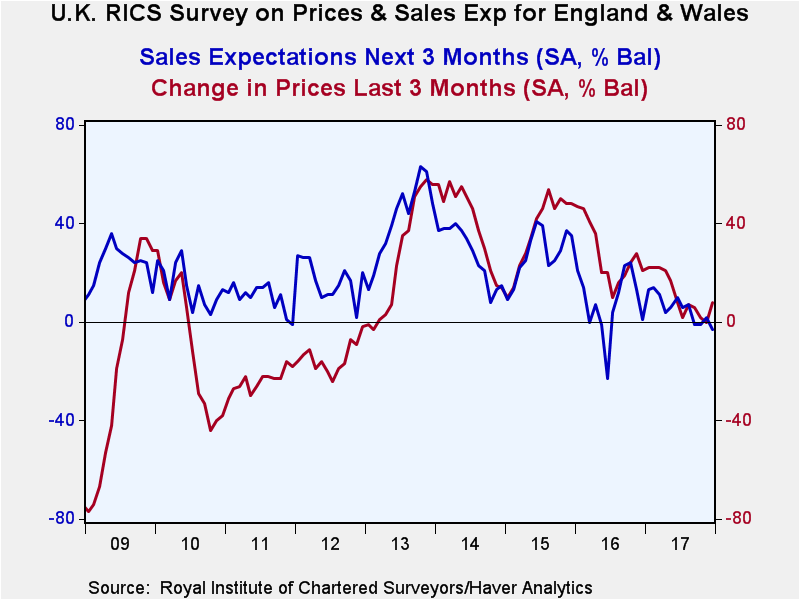 Global| Jan 18 2018
Global| Jan 18 2018RICS Shows Weakening Trend for U.K. Housing
Summary
Expectations for sales and prices in the housing market have been slipping in the RICS survey of U.K. home prices and sales. December has brought an unexpected jump in prices, but price expectations continue to ratchet lower. Sales [...]
 Expectations for sales and prices in the housing market have been slipping in the RICS survey of U.K. home prices and sales. December has brought an unexpected jump in prices, but price expectations continue to ratchet lower. Sales expectations are sliding as well. New sales are off their October lows but still weak and slipping.
Expectations for sales and prices in the housing market have been slipping in the RICS survey of U.K. home prices and sales. December has brought an unexpected jump in prices, but price expectations continue to ratchet lower. Sales expectations are sliding as well. New sales are off their October lows but still weak and slipping.
We are seeing Brexit effects in these numbers as Brexit uncertainly is adversely affecting perceptions of the market and its future. Many high-end banking sector jobs are being shifted into EU member states. As they leave, high-end owners and renters leave too, and that weakens both the housing and rental markets.
Comparing todays RICS survey values to the month just before the Brexit vote shows surprisingly little change in expectations for either price or sales (but these are only outlooks for three months ahead in any case). However, actually prices in the RICS survey are 12 points lower today than in May 2016. And consumer confidence overall is lower by 12 points than it was in May 2016. The consumer confidence standing in May 2016 was in its 81st percentile and that has slipped to a much more mid-range 54th percentile. Sales prices have slipped from a 71st percentile reading to a 63rd percentile of their range reading as of December. The Nationwide house prices survey shows that compared to May 2016, house prices are higher by 4.9%. But on that timeline, the rate of increase of U.K. house prices has been slowing and it has been doing so at a time that inflation has accelerated. House prices are struggling to maintain their value in real terms.
Overall the rate of increase of house prices is slowing. And consumer confidence has been slipping. With inflation still above the Bank of England target and a process of rate hiking having begun, the U.K. housing market appears to be in a difficult phase. However, despite all the challenges, U.K. growth has held up in part because it has been propped up by aggressive BOE easing in the wake of the Brexit vote and by substantial drop in the pound sterling's value. But the BOE has shifted again and has started to raise rates in response to inflation which has been over the top of its target. Other central banks too are disengaging from their tilt to ever more stimulus. If the BOE is going to continue on the path of rate hikes, mortgage rates are going to rise and the U.K. housing market will face yet another hurdle.

Robert Brusca
AuthorMore in Author Profile »Robert A. Brusca is Chief Economist of Fact and Opinion Economics, a consulting firm he founded in Manhattan. He has been an economist on Wall Street for over 25 years. He has visited central banking and large institutional clients in over 30 countries in his career as an economist. Mr. Brusca was a Divisional Research Chief at the Federal Reserve Bank of NY (Chief of the International Financial markets Division), a Fed Watcher at Irving Trust and Chief Economist at Nikko Securities International. He is widely quoted and appears in various media. Mr. Brusca holds an MA and Ph.D. in economics from Michigan State University and a BA in Economics from the University of Michigan. His research pursues his strong interests in non aligned policy economics as well as international economics. FAO Economics’ research targets investors to assist them in making better investment decisions in stocks, bonds and in a variety of international assets. The company does not manage money and has no conflicts in giving economic advice.
More Economy in Brief
 Global| Feb 05 2026
Global| Feb 05 2026Charts of the Week: Balanced Policy, Resilient Data and AI Narratives
by:Andrew Cates






